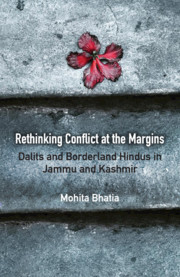Book contents
- Frontmatter
- Contents
- List of Figures and Tables
- Preface
- Acknowledgements
- 1 Introduction
- 2 Regional Diversities and the Conflict
- 3 Caste, Everyday Life and Conflict Politics
- 4 Border Realities: Contesting Hegemonic Paradigms of Nationalism and Conflict
- 5 Contesting the Homogenised Discourse of Religious Identities
- 6 Conclusion
- Glossary
- Bibliography
- Index
1 - Introduction
Published online by Cambridge University Press: 30 April 2020
- Frontmatter
- Contents
- List of Figures and Tables
- Preface
- Acknowledgements
- 1 Introduction
- 2 Regional Diversities and the Conflict
- 3 Caste, Everyday Life and Conflict Politics
- 4 Border Realities: Contesting Hegemonic Paradigms of Nationalism and Conflict
- 5 Contesting the Homogenised Discourse of Religious Identities
- 6 Conclusion
- Glossary
- Bibliography
- Index
Summary
Suraj's face lit up as he showed me photographs of his siblings. I had already met him a few times at a grocery shop in Danidhar: one of the villages in a remote border district of Jammu (Jammu and Kashmir state, India) where I was doing my fieldwork. It was during our conversation, with others gathered around in the shop, about families separated by borders, that Suraj invited me to visit his home and family: ‘You can come to my house. I will show you pictures of my elder brothers and younger sister who live in the other Jammu and Kashmir, on the Pakistan side. They are now Muslims.’ ‘They were left behind in Pakistan in 1947–48 partition times and taken care of by my father's Muslim friend. He had suggested that they convert to Islam so that they can live fearlessly in Pakistan…. Our religion is different but we share the same blood,’ he informed me. Suraj was born in India but had managed to get a visa to visit his siblings. ‘I don't have words to describe to you how I felt when I first saw my family … my sister and brothers. I get goosebumps when I recall those moments…. We were meeting for the first time, yet we did not feel like strangers. We hugged, talked and talked tirelessly.’ A middle-caste Hindu, Suraj had spent most of his life in Danidhar village. His two sons looked after his retail business as well as agricultural work under his supervision. ‘I am well settled here with my family. But there is always something missing, I feel. I sometimes feel empty and anxious…. I miss my brothers. I miss my younger sister from whom I was separated due to India–Pakistan border.’ Suraj was ecstatic as he described who was who and provided context about the background in the photographs that have been posted to him by his relations; yet he looked tearful as he glanced through each of these. ‘I want to meet my brothers and sister once more so that I can die peacefully’, he said.
- Type
- Chapter
- Information
- Rethinking Conflict at the MarginsDalits and Borderland Hindus in Jammu and Kashmir, pp. 1 - 22Publisher: Cambridge University PressPrint publication year: 2020



